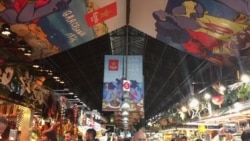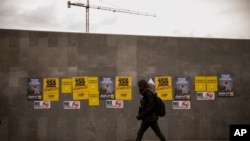Just off Barcelona’s famous Rambla is the world-famous La Boqueria food market. On a recent winter morning, chefs rubbed shoulders with local residents buying their daily provisions, all watched over and photographed by hundreds of tourists attracted by the colors, smells and the chance to taste some of Catalonia’s revered cuisine.
But the richness of this cathedral to Catalan gastronomy hides a growing disquiet among many of the market sellers.
Poultry vendor Maria José Artiaga says the scenes of protest and political chaos following Catalonia’s disputed referendum on independence are putting off visitors.
"Sales have fallen between 30 percent and 40 percent, and for me the political situation is very worrying," Artiaga said. "In the end, all we are interested in is working, paying our workers and reaching the end of the month."
Artiaga is a well-known figure in the market community. She is also an activist for the Socialist Party, which is campaigning against Catalan independence.
Not all the vendors share her politics.
"Before the referendum, other vendors made a circle around me and shouted, 'We will vote!' They insulted me, called me a fascist. This hurt because, in my family, all our lives we have been leftists and republicans, and my grandfather was shot dead because he was a republican. For me, these words were like a dagger in my back,” she told VOA.
Residents of Catalonia will vote in regional elections Thursday, two months after separatist campaigners tried to declare independence from Madrid following the disputed referendum. Many leaders of the secessionist movement have been arrested.
The Spanish government called the upcoming election in an attempt to take the heat out of the crisis and is hoping a silent majority will vote for pro-unity parties.
Regional ties could be cut
Many Catalans who oppose independence say it would devastate the region’s economy. Josep Bou owns a large bakery business supplying vendors across Catalonia and beyond, having built up the business from the corner store his father began in the 1950s. He leads a business group campaigning against Catalan independence.
"We are intertwined with suppliers from the rest of Spain," Bou said. "The flour we buy in Aragon, the nuts from Cordoba, the empanadas from Galicia. The independence that the nationalists desire would disconnect us from Spain and Europe, and consequently we would lose all the advantages. And for that we are against separatism."
Many business leaders fear the breakaway movement could tip Spain, and Catalonia, back toward economic crisis just as the country is growing after a decade of stagnation.
However, independence supporters say other regions of Spain drain Catalonia’s hard-earned prosperity.
Thursday’s election is unlikely to offer a definitive answer, with polls showing votes will likely be divided across several different parties, each with differing positions on independence.
Meanwhile, the fierce arguments over identity, politics and prosperity are tearing deep divides in Catalan society.






